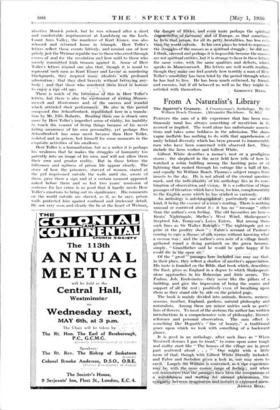From A Naturalist's Library
The Squirrel's Granary. A Countryman's Anthology. By Sir William Beach Thomas. (Alexander Maclehose. 7s. Bd.) PERHAPS the sum of a life experience that has been con- tinuously rural has always something of mysticism in it, avowed or implicit. The word alone has unfortunate associa- tions and takeS some boldness in the admission. The sham vague ineffable has nothing to do with that apprehension of unity behind diversity which has been present to innumerable men who have been concerned with observed fact. They include the farm worker and Gilbert White.
Gilbert White describes a mouse's nest or a prodigious storm : the shepherd in the next field here tells of how he watched a robin building among the - lambing pens or of lightning that rushed through his cottage like a ball of fire, and equally Sir William Beach Thornas's subject ranges front insects .to the sky. He-is not _afraid_ of the eternal questin:i mark, and theindividuality'of his- anthology lies in its com- bination of observation and Vision,- It is a collection of those passages of literature which have been, for him, complementiry to the Englishseene which liefiasiatialied so variously-. An anthohigy is luitobiograOkivar; particularly one of Of; kind, it lbeingihe essence or reading. There is nothing unusual or contrived about it ; it has no " message " other than the author's own feeling. The old favourites are here— Keats' Nightingale, Shelley's West Wind, Shakespeare's Seeptred Isle, Tennyson's, Lotos Eaters. But among them such lines as Sir Walter ,Raleigh's The nightingale got no prize at the poultry show " ; Fabre s account of Pasteur's coming to;cure a dusease of silkworms without knowing what a cocoon was ; and the author's own note of a village family gathered _round a dying patriarch on the green because. simply, " erandfather said he would be quite happy if he could die in!ihenperi, Of the " greti"51ritasagea1iere di-ichidtid...one may say that in their place, they reflect shadow Of.another's appreciation. His taste is fourided on the Bible, that book which, describing the East, gives. us England in a degree to which Shakespeare alone approaches in his Bohemian and Attic scenes. The Psalms, Job,' Ecelesiastes=theY occur like the pillars of a building, and give the impression of being the source and support of all the rest ; positiveiy even of breathing upon them as they stand side by side on the-printed page.
The book is mainly divided into animals, flowers, scenery, seasons, weather, England, gardens: natural- philosophy and naturalists. Among these are painor unities such as poets' lists of Rowers. To most of the sections the author hag written introductions in a compreheniive vein of philosophy, literary reference and personal observation. The suni effect is something like Hogarth's ".line of ,,beinty.," a _traditional grace upon which we look with something of a backward
. . • glance.
It is good in an anthology', after such lines as " When Westwell downs I gan to tread," to Cottle upon some tough and stalky start like " The houies of the village are in great part scattered shod ':".Clne might wish a little more of that, -though With Smitelibertity included, and Fabre and Seebilm gii;en a loOk in;:ene may seem to cavil. - Lai ely:Sir William is ennberiied;:ai ripe .exiierience may be, with the more cosmic iarige,,Of feeling ; and when oril;reiArnberS *t hat the paigeS h-aVehtrin the Companions of a a-tehftiiileaa and Waiting for' nktiiral ptietyomens, the Sgaiht i/1146Lition 44ke,Sied Avaiev BELL.














































 Previous page
Previous page